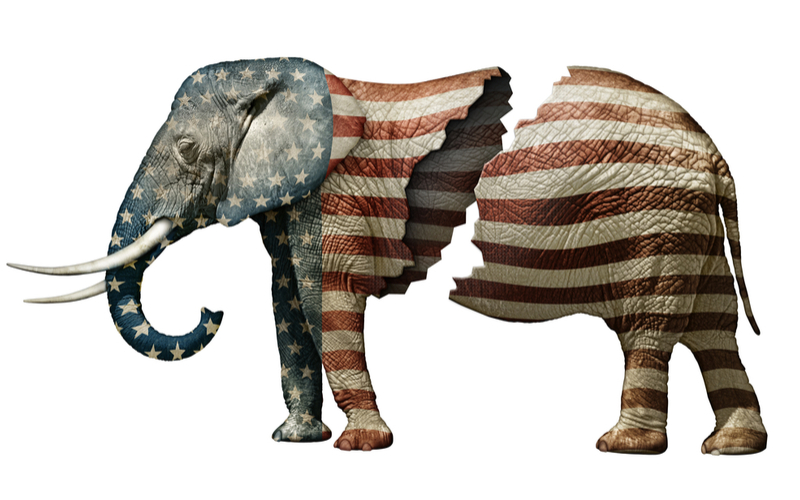Are Republicans Turning Against Markets?
“Republican leaders will have to acknowledge that market capitalism is not a religion.” “You would have to be a fool to worship it.” “We do not exist to serve markets.” Markets are merely a tool like a toaster or a staple gun, this thinking goes, something useful but not essential for life.
These are words coming from popular political commentator and well-known Republican Tucker Carlson last month. As Carlson berates capitalism, he makes sure to appeal to the average American, the working class, turning his criticism into a purely populist monologue. His is one of many Republican voices speaking with resentment toward an economic form that Republicans have long touted as one of their fundamental values: the free market.
As for those who have long celebrated an interventionist state, Carlson’s words were an occasion for celebration. Any rhetorical blast that helps to weaken confidence in markets helps the institution that poses the single greatest threat to economic freedom: the state itself.
After World War II, Republicans expressed a rhetorical commitment to the values of capitalism and the free market, small government, and an anti-communist agenda as they rebelled against Roosevelt’s New Deal and the expansion of the state that came with it. This led to an unlikely alliance between conservatives and libertarians as the rise of the state and communist ideals, represented by the Soviet threat, was a threat to both groups’ core values.
A pressing question now arises as to what caused Republicans to diverge from their past (at least nominal) commitment to free markets and toward the populism and nationalism we are seeing today. It could be the narrative of rising inequality persistently portrayed by the media, a narrative creating a psychological wedge between the working class and the wealthy 1 percent. Or it could be the fear that China will overtake the United States, which has ignited a passion for national pride among Americans. It may be that Americans have forgotten the results of past nationalist policies such as the Smoot-Hawley tariffs (1930) and George W. Bush’s steel tariffs (2002).
The party’s governing practices have fallen far short of its rhetorical commitments to free markets that typified its mid-century economic alliance with libertarianism.
The Divergence, in Numbers
Since Trump’s inauguration, government spending has increased by $232.2 billion to $6.74 trillion as of January 2018. On the same note, the budget deficit increased by $113 billion to $779 billion, a 17 percent increase. This should not come as a surprise, as Trump is not the first Republican president to oversee large increases in the size of government.
Previous Republican President George W. Bush oversaw a 53 percent increase in the federal budget through expanded entitlement programs and increased military spending for the Iraq War, and advocated government involvement in markets amid the global financial crisis. Defense spending increased by 89.25 percent from $404 billion to $765 billion during Bush’s presidency.
A statement George W. Bush made in his interview on CNN on December 16, 2008, summarizes shifting Republican values: “I’ve abandoned free market principles to save the free market system.”
Kicking the Can Down the Road
The Tax Cuts and Jobs Act (2017) gave a boost to America’s economic competitiveness and encouraged spending that stimulated the economy through the end of 2018. Unemployment decreased to 3.7 percent, its lowest since 1969, and financial markets continued to climb throughout 2017 and most of 2018, with the Dow Jones and S&P 500 peaking in September 2018. The Consumer Confidence Index peaked in October 2018, its highest since 2000.
However, the economy is now starting to slow with fears of a coming recession as financial agencies such as the IMF lower their U.S. growth forecasts for 2019. Unemployment has risen slightly, the Dow Jones and S&P 500 have taken a dive from their September peaks, and consumer confidence has been declining. The threat of a trade war is present, caused by Trump’s vendetta against Chinese manufacturers and hostility to globalization.
Stimulus from the tax cuts appears short-lived, as the cuts sparked increased spending but have not resulted in large increases in investment. A possible explanation is Milton Friedman’s permanent income hypothesis and Franco Modigliani’s life-cycle hypothesis, which show that consumers smooth their income over their lifetimes based on their expected long-term-average income.
In order to fund the increases in government spending and the deficit, taxes in the future must go up, and consumers recognize this. The tax cuts are just a short-term fix kicking the can down the road.
Economic Policy Driven by Emotion
The $250 billion in tariffs implemented in 2018 against China are an example of how the Republicans are moving away from their free market roots and toward a populist and nationalist movement. Tariffs interfere with the free market by distorting price signals and impacting production and consumption decisions. Domestic consumers bear the brunt of the cost.
Trump had one goal in implementing the tariffs:for “us,” American workers, to beat “them,” Chinese capitalists. Trump frequently claims tariffs will do this by bringing jobs back to America, a purely populist and nationalist argument that ignores the economic realities of such a policy. This policy fails to see how American producers and consumers have benefited greatly through trade and the globalization of production.
Trade between the U.S. and China occurs on the basis of mutually beneficial arrangements allowing producers to lower their costs of production and consumers to attain goods at a lower cost and of greater variety. Consumers have never been forced to purchase goods produced overseas; they do so willingly based on their own preferences.
Republicans and their supporters are increasingly dissatisfied with traditional Republican economic policy, but Republican politicians still brand their party as a free market, small-government party that will reduce the budget deficit — and their supporters continue to believe them.
The tariffs symbolize a turning point when a country’s emotions replace sound economic policy. Old economic policy is being replaced by one in which the government increasingly intervenes in mutually beneficial arrangements between producers and consumers.
Tariffs (such as Smoot-Hawley and Bush’s steel tariffs) have come in and out of fashion throughout U.S. history and always make consumers and producers who use the tariffed goods worse off. Economic policy can be summarized by a large cost dispersed among all Americans, and a benefit concentrated on a small group.
No, we do not exist to serve markets; markets exist to serve all people through the freedom to create, trade, and live a better life.











